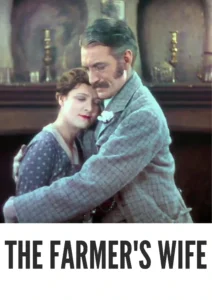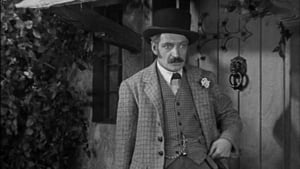Contact: [email protected]
Video Sources 0 Views
- The Farmer's Wife


Synopsis
Table of Contents
ToggleReview: The Farmer’s Wife (1928) – A Heartfelt Comedy Revived in Early Colored Splendor

Introduction
“The Farmer’s Wife” (1928) is a delightful comedy that stands as a testament to the enduring charm of silent cinema. In this article, we’ll explore the significance of this early colored film and its ability to captivate audiences with its timeless humor and heartfelt storytelling.
Check The Full Colorized Movies List
Check Our Colorized Movies Trailer Channel
Understanding The Farmer’s Wife (1928): Director, Cast, and Genre
Directed by the legendary Alfred Hitchcock, “The Farmer’s Wife” (1928) showcases his early talent for blending comedy and drama with effortless grace. The film features a talented cast of actors, including Jameson Thomas and Lillian Hall-Davis, whose endearing performances bring the characters to life with warmth and authenticity. With its blend of humor, romance, and heart, “The Farmer’s Wife” (1928) remains a classic example of silent cinema at its finest.
Exploring the World of The Farmer’s Wife (1928): Plot and Characters
At its core, “The Farmer’s Wife” (1928) tells the story of a widowed farmer who embarks on a quest to find a new wife. Along the way, he encounters a colorful array of characters, from meddling neighbors to well-meaning matchmakers, each adding their own unique flavor to the tale. As the farmer navigates the ups and downs of the courtship process, he discovers that true love may be closer than he thinks, leading to a heartwarming conclusion that is sure to leave audiences smiling.
The Art of Film Colorization
Film colorization has the power to breathe new life into classic movies, transforming black and white images into vibrant works of art that captivate the imagination. By adding color to silent films like “The Farmer’s Wife” (1928), colorization allows audiences to experience these timeless stories in a whole new light, unlocking new dimensions of emotion and visual splendor.
Early Colored Films: A Brief History
The history of colored films dates back to the early days of cinema, with filmmakers experimenting with various techniques to add color to their creations. From hand-painted frames to early tinting and toning processes, the evolution of colored film has been marked by innovation and creativity, paving the way for the development of modern colorization techniques that continue to captivate audiences today.
The Farmer’s Wife (1928) and Its Early Colored Version
The decision to release “The Farmer’s Wife” (1928) in a colorized format was met with both anticipation and excitement. While some purists may argue that colorization compromises the integrity of the original work, others see it as an opportunity to introduce classic films to new audiences and breathe new life into beloved stories. In the case of “The Farmer’s Wife” (1928), the early colored version adds a new layer of visual richness to the film, enhancing its timeless appeal and inviting viewers to experience its humor and heart in vivid detail.
The Debate Over Film Colorization
The debate over film colorization is a complex and ongoing issue, with passionate arguments on both sides of the divide. While some view colorization as a way to modernize classic films and attract new audiences, others see it as a form of artistic sacrilege that diminishes the integrity of the original work. As technology continues to evolve and the boundaries of cinematic expression expand, the debate over film colorization will likely continue for years to come.
Examining The Farmer’s Wife (1928) as an Early Colored Film
As with any colorized classic, the impact of colorization on “The Farmer’s Wife” (1928) is a matter of personal interpretation. While some may argue that colorization enhances the film’s visual appeal and immerses viewers in its world, others may feel that it detracts from the stark beauty of the original black and white version. Regardless of one’s stance on the issue, there’s no denying the enduring charm of “The Farmer’s Wife” (1928) as a timeless comedy that continues to entertain audiences with its humor and heart.
Influence and Legacy: The Farmer’s Wife (1928)’s Impact on Cinema
“The Farmer’s Wife” (1928) has left an indelible mark on the world of cinema, inspiring countless filmmakers and captivating audiences with its timeless humor and heartfelt storytelling. From its endearing characters to its witty dialogue, the film remains a classic example of silent cinema at its finest, reminding us of the enduring power of laughter and love to transcend the barriers of time and space.
Director’s Cinematic Legacy: Beyond The Farmer’s Wife (1928)
Alfred Hitchcock’s influence extends far beyond “The Farmer’s Wife” (1928), with a diverse body of work that continues to captivate audiences around the world. From “Psycho” to “Vertigo,” Hitchcock’s films are celebrated for their masterful storytelling, innovative camerawork, and unforgettable characters, solidifying his legacy as one of the greatest directors in cinematic history. Through his groundbreaking work, Hitchcock has left an indelible imprint on the world of cinema, inspiring generations of filmmakers to follow in his footsteps.
Themes Explored in The Farmer’s Wife (1928)
“The Farmer’s Wife” (1928) explores a myriad of themes, from the search for love and companionship to the resilience of the human spirit in the face of adversity. Through its endearing characters and witty dialogue, the film invites audiences to ponder the complexities of human relationships and the universal quest for happiness and fulfillment. As viewers immerse themselves in the world of “The Farmer’s Wife” (1928), they are reminded of the timeless truths that bind us together as human beings and the enduring power of laughter to heal the soul.
Reception and Controversy Surrounding The Farmer’s Wife (1928)
Upon its release, “The Farmer’s Wife” (1928) received widespread critical acclaim, with many praising its heartfelt performances, witty dialogue, and timeless humor. However, the decision to release the film in a colorized format sparked debate among purists, reigniting the age-old discussion surrounding film preservation and artistic integrity. Despite the controversy, “The Farmer’s Wife” (1928) remains a beloved classic that continues to entertain audiences of all ages, reaffirming its status as a timeless masterpiece of silent cinema.
Where to Watch The Farmer’s Wife (1928) Online
For those eager to experience the timeless charm of “The Farmer’s Wife” (1928), the film is readily available on popular streaming platforms such as Netflix, Amazon Prime, and Hulu. Whether you choose to watch it in its original black and white format or the early colored version, “The Farmer’s Wife” (1928) promises to delight audiences with its humor, heart, and unforgettable characters.
FAQs About The Farmer’s Wife (1928)
Q: Is “The Farmer’s Wife” (1928) based on a true story? A: No, “The Farmer’s Wife” (1928) is a fictional comedy that follows the misadventures of a widowed farmer as he searches for a new wife. While the film incorporates elements of humor and romance, its characters and plot are products of the screenwriter’s imagination rather than historical documentation.
Q: Who are the main actors in “The Farmer’s Wife” (1928)? A: “The Farmer’s Wife” (1928) features an ensemble cast led by Jameson Thomas and Lillian Hall-Davis, whose endearing performances bring the characters to life with warmth and authenticity.
Q: What awards did “The Farmer’s Wife” (1928) win? A: While “The Farmer’s Wife” (1928) did not win any major awards, it received critical acclaim for its heartfelt performances and timeless humor, solidifying its status as a beloved classic of silent cinema.
Q: Why was “The Farmer’s Wife” (1928) released in a colorized format? A: The decision to release “The Farmer’s Wife” (1928) in color was made to introduce the film to a new generation of viewers and enhance its visual appeal for modern audiences. While the choice to colorize the film sparked debate among purists, it ultimately allowed “The Farmer’s Wife” (1928) to reach a wider audience and ensure its continued relevance in the annals of cinematic history.
Conclusion
“The Farmer’s Wife” (1928) remains a timeless classic that continues to captivate audiences with its humor, heart, and unforgettable characters. Whether viewed in its original black and white format or the early colored version, the film serves as a testament to the enduring power of laughter and love to transcend the barriers of time and space. As we celebrate the legacy of “The Farmer’s Wife” (1928), let us remember the joy it brings to audiences of all ages and the timeless truths it imparts about the human condition.











